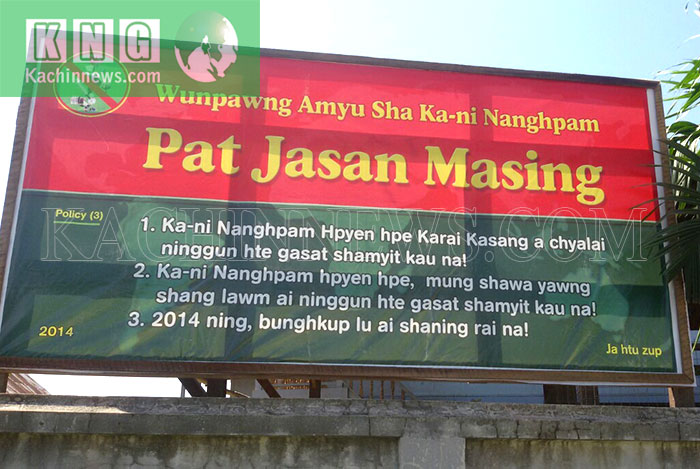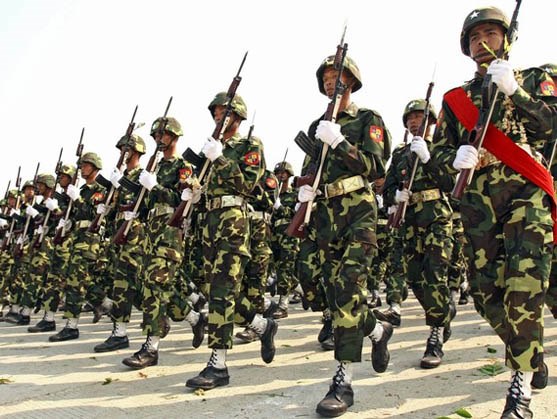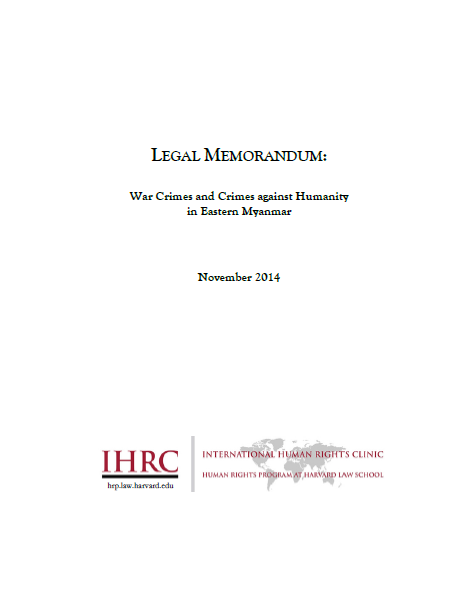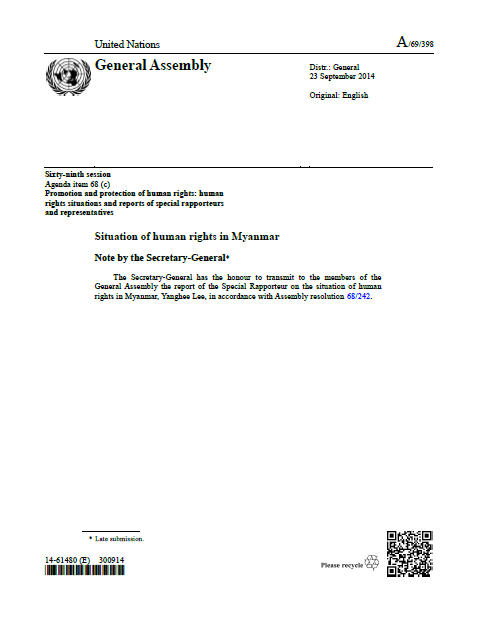Posts Tagged ‘Kachin’ (94 found)
Letter to President Obama
Dear President Obama,
We are writing on behalf of Kachin Society from Myanmar and abroad, composed of (27) organizations and networks.
We would like to welcome your administration’s courageous step in engaging with the Myanmar government, including your visit in 2012 and your delivery of the important speech at the University of Yangon. It resonates with us to this day. […]
• • •Kachin Church Groups Continue Drug Eradication Campaign
 Across Kachin state local drug eradication committees backed by church groups are continuing their drug elimination efforts amidst what many Kachin say is a full blown crisis in their state.
Across Kachin state local drug eradication committees backed by church groups are continuing their drug elimination efforts amidst what many Kachin say is a full blown crisis in their state.
On November 11th at Man Wing Gyi village in Bhamo district, campaigners distributed pamphlets and set up posters along the roadside. […]
• •Key Messages to World Leaders, International Governments and the UN Concerns and Requests Related to Humanitarian Situation in Kachin and Northern Shan States, Myanmar
The 25th ASEAN Summit is commencing from 11 to 13 November 2014, hosted by Myanmar in its capital, NaypyiTaw. Most prominent world leaders are gathering and discussing important matters affecting the ASEAN countries and, inevitably, the interconnected global arena. On this occasion, Joint Strategy Team for Kachin Humanitarian Response would like to urge the world leaders, international governments and the UN to pay attention to the following concerns and take immediate actions to fulfill the requests. We firmly believe that the world leaders, international governments and the UN will strongly support the protection of dignity and rights of the internally displaced persons. […]
• • •Impunity for Military Abuses Has to End
 On 7 November, the International Human Rights Clinic (the Clinic) at Harvard Law School published a Legal Memorandum which establishes that certain Burma Army commanders are guilty of crimes against humanity and war crimes under international criminal law. The Legal Memorandum submits its findings on the basis of a three-year investigation (the Investigation) into human rights abuses associated with a Burma Army offensive in Karen State, which was launched in late 2005 and continued into 2008 (the Offensive). The Clinic chose this offensive “because it was one of the largest in recent memory and was widely condemned by the international community.” The Investigation focused specifically on the conduct of two military units – Southern Regional Military Command (SRMC) and Light Infantry Division 66 (LID 66) – in Thandaung Township, Karen State.
On 7 November, the International Human Rights Clinic (the Clinic) at Harvard Law School published a Legal Memorandum which establishes that certain Burma Army commanders are guilty of crimes against humanity and war crimes under international criminal law. The Legal Memorandum submits its findings on the basis of a three-year investigation (the Investigation) into human rights abuses associated with a Burma Army offensive in Karen State, which was launched in late 2005 and continued into 2008 (the Offensive). The Clinic chose this offensive “because it was one of the largest in recent memory and was widely condemned by the international community.” The Investigation focused specifically on the conduct of two military units – Southern Regional Military Command (SRMC) and Light Infantry Division 66 (LID 66) – in Thandaung Township, Karen State.
Articles 7 and 8 of the Rome Statute of the International Criminal Court (ICC) set out the legal requirements for an action to qualify as a “crime against humanity” or a “war crime,” respectively. The essence of a “crime against humanity” is that the act in question should be “part of a widespread and systematic attack directed against any civilian population, with knowledge of the attack.” Similarly, Article 8 stipulates that a “war crime” must be committed “as part of a plan or policy or as part of a large-scale commission of such crimes,” and must constitute a grave breach of the Geneva Conventions 1949, which regulate the conduct of armed conflict […]
• • •Legal Memorandum: War Crimes and Crimes Against Humanity in Eastern Myanmar
In January 2011, the Harvard Law School International Human Rights Clinic (“the Clinic”) began to investigate the actions of the Myanmar Army during a military offensive in eastern Myanmar (“the Offensive”) that began in late 2005 and lasted approximately three years. The Clinic sought to determine whether violations of international criminal law occurred during the Offensive, and whether there exist reasonable grounds to assert that individual military officers could be held responsible for those crimes. The Clinic’s investigation focused specifically on the conduct of two military units—Southern Regional Military Command (“Southern Command”) and Light Infantry Division 66 (“LID 66”)—in Thandaung Township, Kayin State. […]
• • •PRESS RELEASE: Harvard Law School Implicates Senior Myanmar Officials in War Crimes and Crimes Against Humanity
Yangon, Myanmar-A four-year investigation by the International Human Rights Clinic at Harvard Law School has found that the Myanmar military committed war crimes and crimes against humanity in 2005-2006, and that perpetrators, including the current Home Affairs Minister, continue to serve at the highest levels of the country’s government […]
• • •Kachin Civil Society Groups Rally for Two Jailed IDPs
Kachin civil society groups held a public gathering in Shwezet church in the Kachin State capital Myitkyina on Tuesday to show their support for two Kachin IDPs, Brang Yung and Lahpai Gam, who were arrested by Burma Army soldiers in mid-2012 and allegedly severely tortured. […]
• •Press Release: U.S. Embassy Rangoon’s Ambassador Derek Mitchell’s Visit to Kachin State
Myitkyina – Ambassador Derek Mitchell visited Myitkyina, Kachin State October 25-27. This was Ambassador Mitchell’s third visit to Kachin State as Ambassador; his first visit was in December 2012 and his second visit was in October 2013. During his three day visit, Ambassador Mitchell met with more than 150 members of Kachin society, including religious leaders, local humanitarian workers, cultural historians, students, NGO leaders, political party […]
• • •UN General Assembly Resolution must Keep the Spotlight on Serious Human Rights Violations
New York, Paris, Bangkok – A UN General Assembly’s Third Committee resolution must continue to address serious human rights violations in Burma, FIDH and its member organization Alternative ASEAN Network on Burma (ALTSEAN-Burma) urged Permanent Missions to the UN during a visit by an FIDH-organized to New-York […]
• • •69th Session of the UN General Assembly – Situation of human rights in Myanmar: Report of the Special Rapporteur on the situation of human rights in Myanmar
I. The mandate of the Special Rapporteur on the situation of human rights in Myanmar was established pursuant to Commission on Human Rights resolution 1992/58 and recently extended by Human Rights Council resolution 25/26. The present report is submitted pursuant to Council resolution 25/26 and General Assembly resolution 68/242.
II. Background
2. Following the completion of the term of the previous mandate holder, the current mandate holder took up her functions only in June 2014, which resulted in a shorter period than usual to conduct a country visit and review the information gathered. The present report therefore sets out the Special Rapporteur’s preliminary observations, to be supplemented by her oral statement to the General Assembly […]
• • •










 All posts
All posts